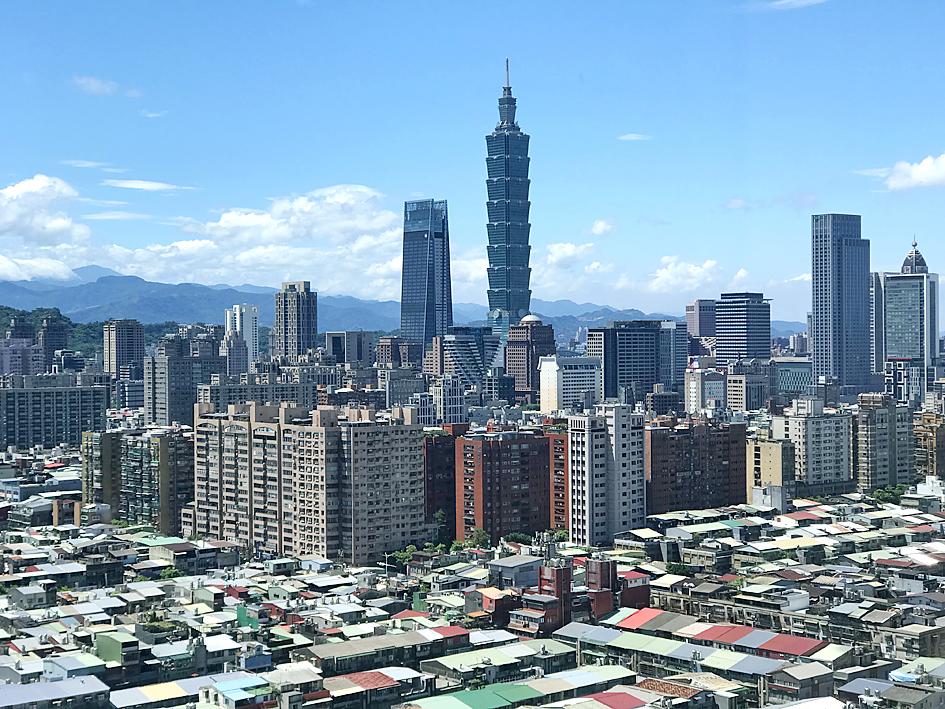Housing transactions last month totaled 17,603 units in the six special municipalities, down 11.2 percent from one month earlier, as the coronavirus pandemic weighed on buying interest, analysts said.
“Prospective buyers turned conservative as the virus outbreak wreaked havoc on major economies around the world, with the US’ GDP shrinking 4.8 percent last quarter,” the worst since the global financial crisis, Evertrust Rehouse Co (永慶房屋) spokesman Jay Hsieh (謝志傑) said.
Although the number of infections is low in Taiwan, consumers have refrained from purchases of durable goods for fear the disease might persist and weaken household incomes, Hsieh said.

Photo: Hsu Yi-ping, Taipei Times
Taichung reported the steepest monthly decline of 21.4 percent to 3,314 units, while Kaohsiung posted a 13.1 percent retreat to 2,684 deals, the broker said, citing data from respective local governments.
Transactions in Tainan slumped 10.8 percent to 1,697 units and weakened 9.8 percent to 3,314 units in Taoyuan.
Taipei and New Taipei City were relatively resilient with declines of 6.9 percent and 5.3 percent to 2,241 and 4,591 deals respectively.
The figures bucked the seasonal trend as the current quarter is normally a high season for the housing market, Hsieh said.
While manufacturing companies in Taiwan have maintained normal operations, service providers, such as restaurants, hotels and retailers saw sharp declines in the number of customers as authorities worldwide ban cross-border travel and locals avoid going out to lower the risk of infection.
The sentiment would erase a 2 percent annual gain in housing transactions in the first four months, Evertrust said.
Sinyi Realty Inc (信義房屋), the nation’s only listed broker, was more optimistic, saying that it has seen sentiment improving from the second half of last month.
Buying interest lost steam in March, but gained some traction after the TAIEX climbed above 10,000 points in the middle of last month, Sinyi research manager Tseng Ching-der (曾敬德) said.
Tseng attributed the stock rally to concerted monetary easing by central banks worldwide to pre-empt a credit crunch and bolster consumer confidence.
The absence of new coronavirus infections for six consecutive days last week in Taiwan would further support the housing market from this month, Tseng said.
In related news, foreigners last quarter bought 332 homes in Taiwan, an increase of 46.3 percent annually and the highest level in 16 years, with floor space of 11,000 ping (36,364m2), H&B Realty Co (住商不動產) said, attributing the increase to capital repatriation.
Additional reporting by staff writer

South Korea’s equity benchmark yesterday crossed a new milestone just a month after surpassing the once-unthinkable 5,000 mark as surging global memory demand powers the country’s biggest chipmakers. The KOSPI advanced as much as 2.6 percent to a record 6,123, with Samsung Electronics Co and SK Hynix Inc each gaining more than 2 percent. With the benchmark now up 45 percent this year, South Korea’s stock market capitalization has also moved past France’s, following last month’s overtaking of Germany’s. Long overlooked by foreign funds, despite being undervalued, South Korean stocks have now emerged as clear winners in the global market. The so-called “artificial intelligence

‘SEISMIC SHIFT’: The researcher forecast there would be about 1.1 billion mobile shipments this year, down from 1.26 billion the prior year and erasing years of gains The global smartphone market is expected to contract 12.9 percent this year due to the unprecedented memorychip shortage, marking “a crisis like no other,” researcher International Data Corp (IDC) said. The new forecast, a dramatic revision down from earlier estimates, gives the latest accounting of the ongoing memory crunch that is affecting every corner of the electronics industry. The demand for advanced memory to power artificial intelligence (AI) tasks has drained global supply until well into next year and jeopardizes the business model of many smartphone makers. IDC forecast about 1.1 billion mobile shipments this year, down from 1.26 billion the prior

NEW IDENTITY: Known for its software, India has expanded into hardware, with its semiconductor industry growing from US$38bn in 2023 to US$45bn to US$50bn India on Saturday inaugurated its first semiconductor assembly and test facility, a milestone in the government’s push to reduce dependence on foreign chipmakers and stake a claim in a sector dominated by China. Indian Prime Minister Narendra Modi opened US firm Micron Technology Inc’s semiconductor assembly, test and packaging unit in his home state of Gujarat, hailing the “dawn of a new era” for India’s technology ambitions. “When young Indians look back in the future, they will see this decade as the turning point in our tech future,” Modi told the event, which was broadcast on his YouTube channel. The plant would convert

People stand in a Pokemon store in Tokyo on Thursday. One of the world highest-grossing franchises is celebrated its 30th anniversary yesterday.